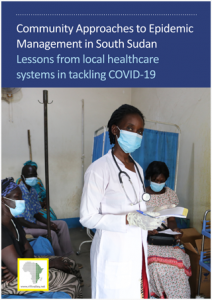South Sudanese people have extensive knowledge of infectious diseases and experience of organizing responses to epidemics during wars and other crises. There are multiple, locally-specific methods used by communities for interrupting infection transmission and managing epidemics. This report documents these community infectious disease management strategies, based on sustained investigative research in the Yei, Juba, Wau, Malakal, Aweil West and Rubkona areas in 2020. The research encourages collaborative engagement with local knowledge and community healthcare leadership.
This is the final report from the Rift Valley Institute’s research project, Community Approaches to Epidemic Management in South Sudan (CAEMSS). The project, which began in response to the global coronavirus pandemic, was designed to document how communities across South Sudan have created systems and structures to control the spread of epidemics and infectious diseases in the country. A summary briefing can be found here.
This report was written by Nicki Kindersley, Peter Majiek, Stephen Othur, Deng Barjok, Emmanuel Luga, Elizabeth Nyibol, Alex Miskin, Chirrilo Madut and Joseph Diing Majok.




